On a cold and snowy New Year’s Eve in 1843, Amasa Sprague finished a large family dinner in his Cranston, R.I., mansion and took a walk.
He probably felt pretty good as he walked off his meal, unaware of what lay ahead. At 45, he had wealth and power. He owned a large calico-dyeing mill and his brother, a U.S. senator, brought him even more influence.
Death of Amasa Sprague
At least two men set upon Amasa Sprague during his stroll. A bullet struck his right forearm, which disabled him for the beating that followed. His attackers struck him on both sides of the skull with a blunt instrument.
Amasa Sprague, a stout and powerful man, struggled violently against his attackers to no avail.
A man who probably didn’t commit the murder went to trial for it. A jury found him guilty and a judge ordered him hanged.
Class Warfare
It was a case of prejudice and class warfare against Irish Catholics rather than one based on evidence. The Irishman’s death – many considered it a legal lynching — exacerbated tensions between Rhode Island’s Yankee and immigrant communities.
The Protestant elite of Rhode Island viewed the Irish-Catholic newcomers with hatred and distrust.
The animosity was mutual. The Irish immigrants who worked at the Sprague mill had to live in Sprague tenements and shop at the Sprague store. Amasa Sprague made sure Irish entrepreneurs didn’t cut into his business.
Grisly Discovery
Sprague’s servant, Michael Costello, was walking home when he found Sprague’s bloody body spread-eagled in the snow. Costello raised an alarm at a nearby house and brought a group of men back to the body.
The murderers had so mangled Sprague’s face that he wasn’t recognized until a doctor identified him. They clearly didn’t intend to rob Amasa Sprague because they left $60 and a gold watch on his body.
A jury was empaneled on the spot and delivered a verdict of murder by a person or persons unknown.
The men brought Sprague’s body back to the mansion. where his wife and four children no doubt viewed his body laid out in the front parlor.
The Suspects
Suspicion immediately fell on Nicholas Gordon, who owned a tavern frequented by Sprague’s millworkers. Gordon’s tavern, attached to his home, was located in the Knightsville section of Cranston. Protestants nicknamed neighborhood ‘Monkeytown’ because of its Irish population.
Amasa Sprague had successfully fought against renewing Gordon’s liquor license because, he said, his Irish millworkers were getting drunk during work hours and neglecting their jobs. Gordon and Sprague had fought publicly.
Once the two men met on a path and neither would give way. Finally Sprague grabbed Gordon by the collar and shouted, “Get out of the way, you damned Irishman!”
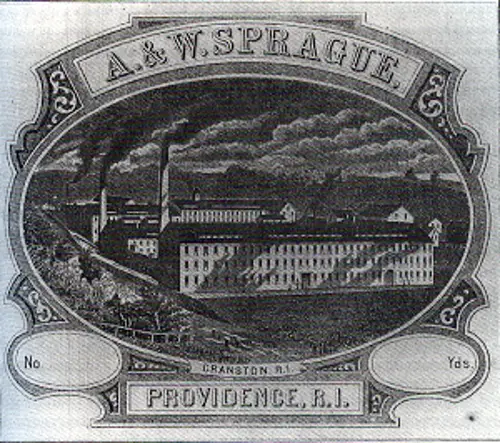
Some thought the murderers had a political motive. Thomas Dorr had been arrested two months earlier for setting up a rival government in Rhode Island that would expand the vote to all adult white men. At the time, only white, propertied men – about a third of adult male population – could vote. The Irish strongly supported the Dorr Rebellion.
Amasa Sprague, his brother William and their brother-in-law Emanuel Rice orchestrated Dorr’s downfall. Could supporters of Thomas Dorr have assassinated Amasa Sprague?
Still others thought Sprague’s brother William committed the murder because the two disagreed about the family business. William wanted to expand the company beyond Rhode Island, while Amasa wanted to manage the business at its current size and profitability. Could William have hired hit men to take out his brother?
John Gordon took the fall for the murder.
‘It is you, William…’
John Gordon had recently arrived from Ireland with his brother William. Their older brother Nicholas had paid for their passage, and John lived with Nicholas.
Sen. William Sprague resigned his Senate seat to supervise the investigation into the murder. In other words, he intended to hunt down Nicholas Gordon.
Unsurprisingly, police soon arrested Nicholas Gordon and his younger brothers, John and William. Investigators had assumed at least two people murdered Amasa Sprague. And everyone knew the Irish always stick together.
Police arrested the Gordons’ dog as well because he could have bitten Amasa Sprague about the neck. A defense attorney described the dog as toothless and old.
The courts tried William and John first. The Irish community rallied behind them, raising funds for their defense.
Their trial reflected the political divisions of the time. The defense attorney strongly supported Thomas Dorr, while the prosecutors opposed him.
The judge told the jury to give greater weight to Yankee witnesses than Irish witnesses. The jury found William not guilty, but declared John guilty.
After the judge announced his sentence, John said, to William, “It is you, William, that have hung me.”
Not So Sure
A broken gun found near the body of Amasa Sprague helped convict John Gordon. Nicholas owned a gun, but searchers could not find it in his house. So investigators assumed Nicholas owned the broken gun.
After the trial it was discovered that William had hidden Nicholas’ gun under the attic floorboards. William feared the gun would throw suspicion on Nicholas. He didn’t realize suspicion would arise from its disappearance.
As for the third brother, Nicholas, he went to trial later. He had an alibi, and the witnesses who convicted his brother were suddenly not so sure of their memories. His trial ended in a hung jury. His gun turned up just before his second trial, which also ended in a hung jury.
The hanging of John Gordon took place on Feb. 14, 1845. Just before he died he said, “I hope all good Christians will pray for me.”
Many believed the courts had railroaded an innocent man. More than a thousand Irish people came from Rhode Island, Connecticut and Massachusetts for his funeral. The procession took a detour to pass the Statehouse and the homes of the Yankee elite.
Seven years later, the Rhode Island Legislature banned capital punishment. In 2011, Gov. Lincoln Chafee pardoned John Gordon.
The Cranston Historical Society is now headquartered in the Amasa Sprague mansion. Some believe it is haunted.
* * *
Available from Amazon. Just click here to order your copy.
This story about Amasa Sprague was updated in 2024.
Image: Sprague mansion By Swampyank – Own work, CC BY-SA 3.0, https://commons.wikimedia.org/w/index.php?curid=23861004
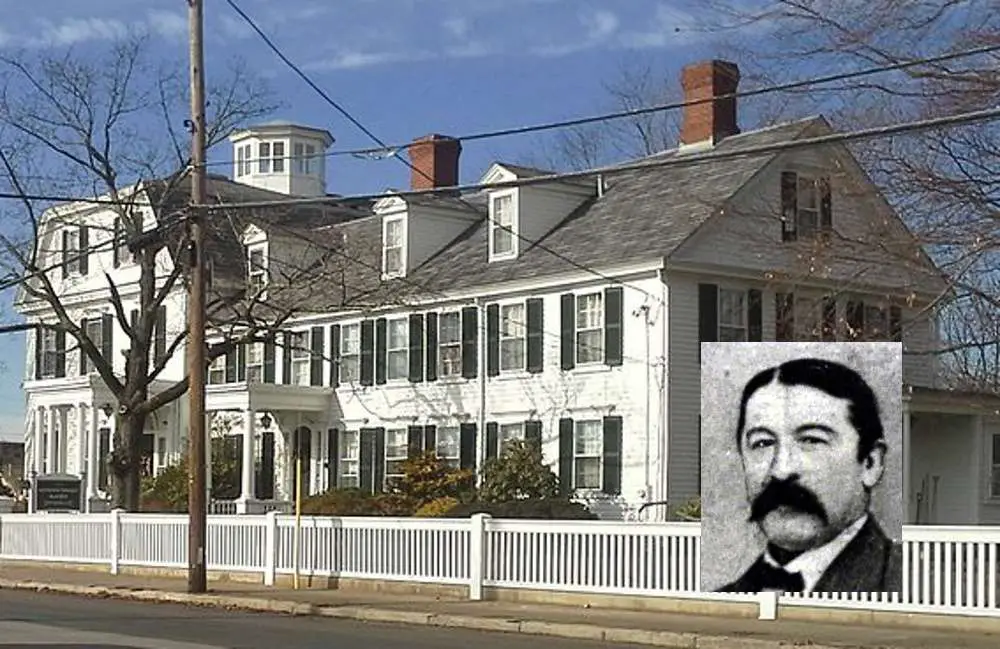
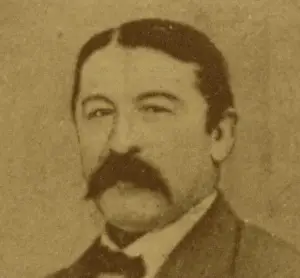
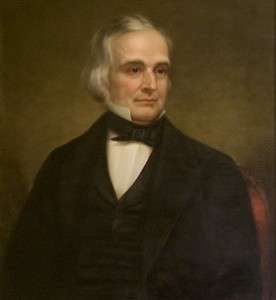
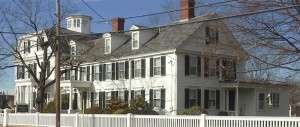
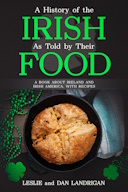
13 comments
Interesting article but is the name Sprague or Stone?
Oops, sorry! It’s Sprague. Thank you for pointing out the error. (There was, btw, an Amasa Stone who also died tragically
http://en.wikipedia.org/wiki/Amasa_Stone
Thanks! I was getting confused and kept rereading the article!
How come we’re not out rioting/protesting
look up the Trial of Haligan and Daley here in Northampton Mass in 1806-Simaler story
Exonerated….150 years later….just in time!
[…] was out of office for some four years. Born into a wealthy and powerful Rhode Island family, his father had been murdered in 1843. The man who was executed for the crime was probably […]
Wow, what an interesting article to stumble upon. Amasa Sprague is in my direct family line but I never knew anything but his name before.
You sir, come from an amazing family! Visionaries of the highest order! You should be very proud!
[…] There was no shortage of potential suspects, according to the New England Historical Society. […]
[…] designs, for carriage and furniture making." Calico was a major employer in Providence, as the Sprague family had dominated the world market for calico for […]
[…] New Year’s Eve 1843, Rhode Island textile baron Amasa Sprague went for a walk. His servant later found his body, shot and […]
Comments are closed.